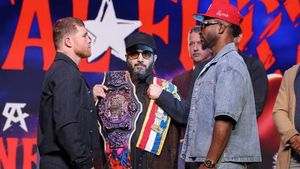The world of sports and crime collided dramatically once again as Luca Lucci, the notorious leader of the Milanese ultras and head of the Curva Sud, faces fresh allegations tied to drug trafficking. Known not just for his fervent support of AC Milan, but also for his significant involvement in organized crime, Lucci has become the focal point of multiple investigations by Milan’s judiciary.
On December 17, 2024, law enforcement officials unveiled yet another astonishing chapter of Lucci's tumultuous life, arresting him amid accusations of spearheading a drug trafficking organization. Alongside Lucci, eight other individuals were detained, all linked to what prosecutors describe as a well-orchestrated plan to smuggle significant quantities of narcotics across national borders. According to the investigation, the group allegedly imported around three tons of hashish, 255 kilograms of marijuana, and 53 kilograms of cocaine, exploiting their vast network to facilitate these transactions.
This latest arrest marks the fourth time Lucci has been apprehended within just over two months, following his prior detainment due to links with the violent underbelly of Milanese football. The previous charges against Lucci are equally severe, encompassing both narcotics offenses as well as his purported role in orchestrated violence against rival fan groups.
According to reports from prosecutor Rosario Ferracane and prosecutor Leonardo Lesti, Lucci was no ordinary leader. He is alleged to have masterminded not only the importation of large quantities of drugs from Spain but also devised mechanisms for transportation difficult to trace. The audacity of Lucci and his accomplices is reflected in their purported plans to utilize helicopters for their operations, including advanced models capable of transporting hundreds of kilograms of illicit substances at once.
The investigation reveals shocking details about the operational sophistication of Lucci's organization. Helicopters such as the Robinson R44 Clipper and larger Agusta models were reportedly on their radar, intended to fly under the radar and evade detection by authorities. Lucci's ambitions were said to stretch far and wide, aiming to create uninterrupted supply chains for drugs sourced from Morocco and other global hotspots.
Initially arrested on charges related to drug trafficking back on September 30, Lucci has not only dealt with the justice system’s repercussions for his past offenses but has also seen his intimate circle of supporters—fellow ultras—drawn deeply back to controversies involving murder plots and organized crime. Notably, his associate Fatjon Gjonaj, currently unaccounted for, has been identified as another key figure pointing to the stark criminal network surrounding Lucci.
Lucci’s reach extended beyond mere fan behavior; he allegedly transformed the Curva Sud—the passionate fan section of AC Milan—into tools for conducting illegal business operations, turning the stadium’s environment from one of spirited competition to one riddled with criminal undertones. Essentially, he became the linchpin, enabling the participation of his followers to engage actively and ominously within this lucrative drug trafficking ring.
Operations grew increasingly brazen as the lockdown imposed during the COVID-19 pandemic created unique opportunities for distribution. Investigators have documented numerous shipments being made at the height of the pandemic, emphasizing how Lucci adapted his methods to whatever circumstances arose. Surprisingly, the ultrà leader seemed unfazed by restrictions, using convoluted transportation methods, including stashing drugs among common delivery packages—a tactic painfully reminiscent of clever film plots.
Messages intercepted through encrypted communication platforms provided by law enforcement painted vivid images of Lucci's world. The breakthrough came when authorities managed to hack the platforms where illicit conversations were taking place, leading to insights about specific drug deals, logistics, and nicknames used within Lucci’s criminal consortium. Lucci himself was referred to as 'Belva', signaling his dominant role, with associates adopting their colorful aliases, reminiscent of some underground cinematic narratives.
The interplay of football fandom and crime has long roots but rarely reaches such sharply defined narratives as with Lucci. Strip away the passionate chants of the stadium, and you reveal not just violence but organized crime underpinned by complex cultural dynamics deeply embedded within Italian society. His ability to mingle with prominent figures—celebrities and entertainers—is equally alarming, hinting at the disturbing intersections between these worlds, where friendship and crime can often overlap.
Apart from his criminal engagement, Lucci's entrepreneurial pursuits have not gone unnoticed, as he's reportedly broken ground on various businesses, including barber shops and tattoos—fronts, many suspect, for laundering money with ties to the organized crime world.
The case surrounding Lucci goes well beyond one man; it unfurls the story of how sports passionate fandom can intertwine dangerously with criminal enterprises, creating multilayered challenges for law enforcement. An undercurrent of violence, drug trafficking, and corruption threatens to obliterate the sanctity of sporting environments, raising painful questions about accountability and the systems allowing these circumstances to thrive.
Through this wave of arrests, investigators aim not only to dismantle Lucci's sprawling drug network but also to spotlight the significant issues of safety and legality intersecting the world of sports. The conversation surrounding connections between crime and football fandom holds valuable lessons for fans, officials, and law enforcement alike. Looking forward, how authorities will untangle the complex web presented by Lucci’s network and others like him remains to be seen, but one thing is clear: the connection between sport and crime might not be severed so easily.
While speculation continues about the outcomes of these various judicial proceedings and what punishment lies ahead for Lucci and his associates, the gravity of these allegations ensures they will remain firmly embedded not just within the courts but within the cultural dialogue surrounding Italian football and its passionate followers.



